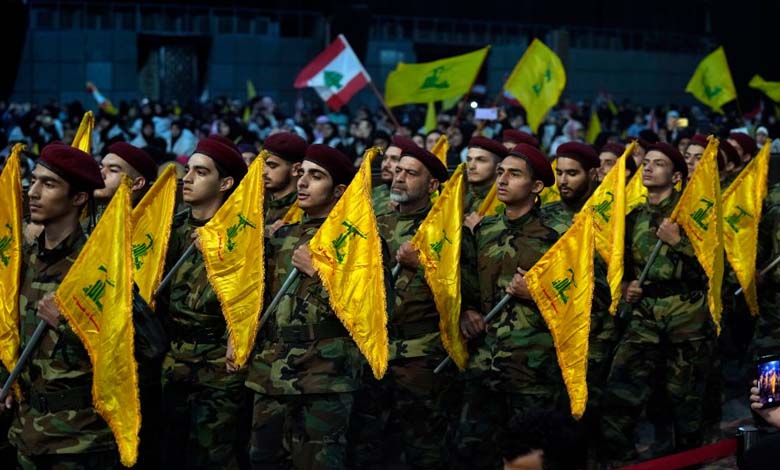U.S. Patience Wears Thin as Hezbollah Disarmament Stalls

Statements by Tom Barrack, the U.S. Ambassador to Turkey and Special Envoy to Syria, during a press conference in New York, stirred significant controversy in Lebanese political circles. Barrack revealed that the Lebanese government’s delay in addressing Hezbollah’s weapons stems from fears of triggering a civil war, while stressing that President Trump’s patience is running out.
-
Hezbollah resists internal and external pressure to disarm
-
After a Defeat… Hezbollah Now Ties the Decision to Go to War to the Lebanese State
Barrack warned that Lebanon is operating within a “limited timeframe”, a clear signal of Washington’s mounting frustration. “President Trump loves Lebanon—perhaps more than any president since Dwight Eisenhower,” he said. “But this patience is not without limits. The Lebanese need to act. They must seize the opportunity. There is engagement with us, which keeps me optimistic, even if I’m occasionally frustrated.”
Despite his cautiously optimistic tone, Barrack’s remarks delivered a veiled message of pressure, urging concrete action to curb Hezbollah’s military influence. What remained unsaid, but clearly implied, was the U.S. fear that ongoing Lebanese procrastination could deepen and prolong the country’s crisis.
-
Israel strikes Hamas, Hezbollah, and Houthi “weapons supply line” in Iran… Who is Behnam Shahriari?
-
Israel Warns Naim Qassem: There Will Be No Hezbollah in That Case
He acknowledged the sensitivity of the situation, stressing that any disarmament must avoid provoking civil conflict. A possible scenario, he suggested, could involve a government-wide consensus and a gradual surrender of Hezbollah’s heavy weaponry, particularly those posing a threat to Israel. “Everyone in Lebanon owns small arms,” he noted, “but the situation changes when it comes to advanced weapons hidden underground and beneath homes.”
Barrack underscored the need to empower the Lebanese army, which enjoys broad respect among citizens, to serve as a mediator in negotiations with Hezbollah. However, he warned that the army had not received salaries for some time, highlighting one of the main obstacles to this process.
-
Lebanon Dismantles Hezbollah Network with Israeli Support
-
Hezbollah’s Footprints in the Heart of Sanaa: Ṣarif Explosion Exposes Iran’s Missile Network
While his comments indicate that Washington still hopes for an internal, peaceful resolution, his reference to a “limited timeframe” suggests that alternative, less diplomatic options may be on the table should Lebanese political efforts fail.
Regional dynamics add further pressure. Barrack alluded to a potential normalization of relations between Syria and Israel, suggesting that Lebanon might eventually follow suit. He quoted Syrian President Ahmad al-Sharaa as saying that “Israel is not an enemy”, signaling shifting regional alliances.
-
Hezbollah courts Trump with a language of interests: from the Great Satan to investment opportunities
-
How Did Israel Target Hezbollah Leaders? Details Emerge to Unveil the Mystery
Additionally, Barrack cited Trump’s bold steps—such as his support for strikes on Iran—as a short-term opportunity to reshape the region. With Iran, Hezbollah, Hamas, and the Houthis in a state of temporary retreat, he said, neighboring states should seize the moment to redefine their positions.
“This is a gradual process,” he concluded. “But I believe these steps are already underway, and that stakeholders are acting responsibly.”
-
Religious Chant Leader Accused of Spying for Israel and Bringing Down Hezbollah Officials
-
Disarming Hezbollah is closer than Ever
Ultimately, Barrack’s comments highlight the immense pressure facing Lebanon’s political elite, not only from Washington, but also from the complex internal realities that make any move against Hezbollah‘s arsenal fraught with danger. And while the U.S. may still prefer a diplomatic outcome, its dwindling patience signals a potential shift toward more assertive strategies.
For now, despite Barrack’s effort to project optimism, Lebanon remains mired in political paralysis and division, casting doubt on its ability to act independently amid mounting external and internal threats.
-
Dismantling of Most of Hezbollah’s Military Sites in Lebanon: Flexibility or Manoeuvre?
-
Mossad Reveals How the Pager Explosions Shifted the Course of the War against Hezbollah











